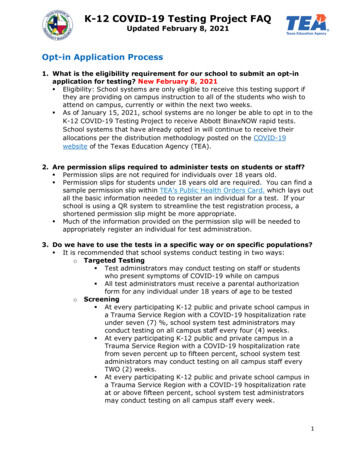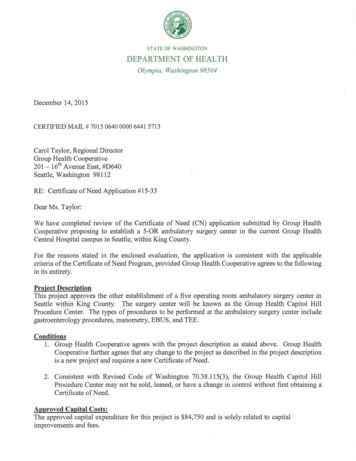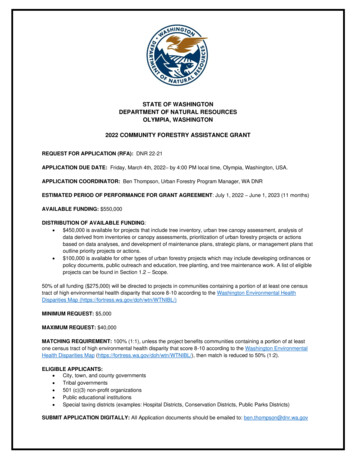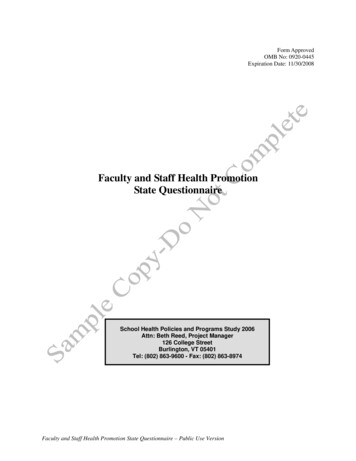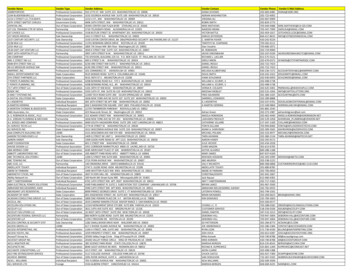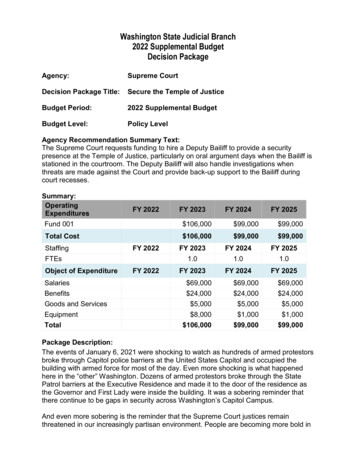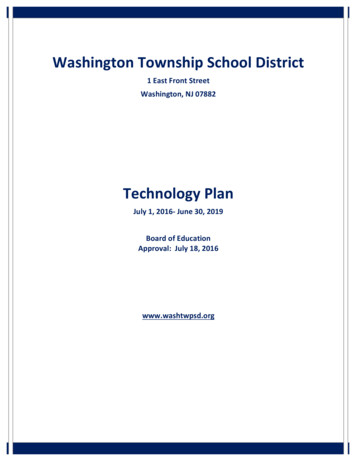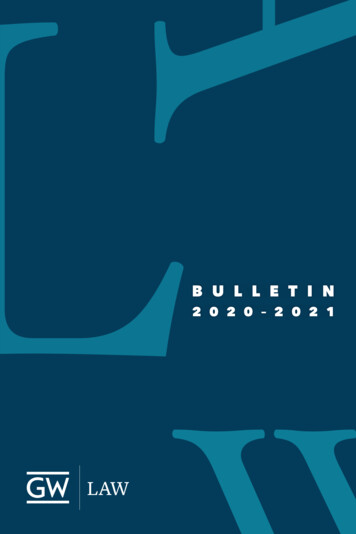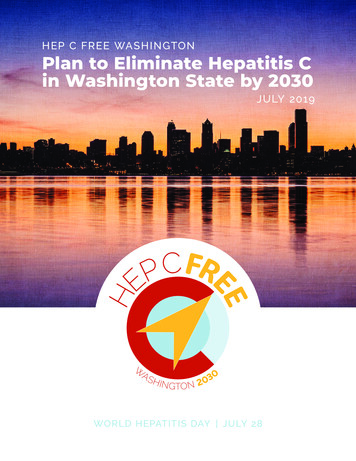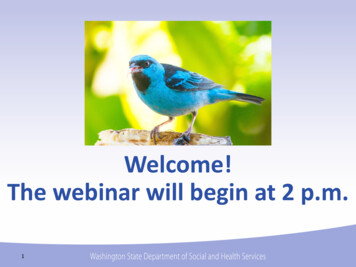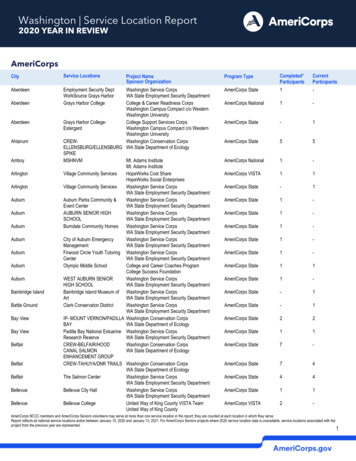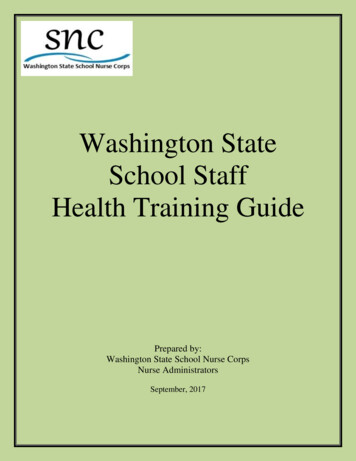
Transcription
Washington StateSchool StaffHealth Training GuidePrepared by:Washington State School Nurse CorpsNurse AdministratorsSeptember, 2017
TABLE OF al Considerations3-4Acronyms5School Staff Health Training Guide6-15Washington State SNC School Health Training GuideAugust, 2012; Revised January, 2015; August, 2016; August 2017Page 1
ACKNOWLEDGEMENTSGail Fast, MN, RN, NCSNESD 105, Yakima, WAGayle Thronson, MEd, RNOSPI, Olympia, WAJudy McCrudden, BSN, RNOESD 114, Bremerton, WAJulie Schultz, BSN, RNNEWESD 101, Spokane, WAKatie Johnson, MN, RN-BC, NCSNOSPI, Olympia, WALes Stahlnecker, MS, RNESD 123, Pasco, WALorali Gray, MEd, RN, NCSNNWESD 189, Anacortes, WALynn Nelson, MSN, RN, NCSNESD 113, Olympia, WAMona Miles-Koehler, MN, RNNCESD 171, Wenatchee, WAWinnie R. Adams, BSN, RNNCESD 171, Wenatchee, WAJulia Kintz, BSN, RNESD 112, Vancouver, WASally Logue, BSN, RNESD 112, Vancouver, WARebecca Cavanaugh, MN, RN, NCSNPSESD, Renton, WAAnnie Hetzel, MSN, RNPSESD, Renton, WARobin Fleming, PhD, RN, NCSNOSPI, Olympia, WASpecial thanks to Lorali Gray who led the work on this guide and to Nancy Hoffman, Ann Elkins andJodi Meekins, School Nurse Corps Administrative Assistants at NWESD 189.Washington State SNC School Health Training GuideAugust, 2012; Revised January, 2015; August, 2016; August 2017Page 2
INTRODUCTION/PURPOSEThis guide is provided by the Washington State School Nurse Corps (SNC) to school districts inWashington State. It is intended for use by school nurses and district administration to assist in thecompliance of state health training for school staff.This is not an official Office of Superintendent of Public Instruction (OSPI) document and servesonly as a guide, not a legal interpretation of required school staff health training. Schools are urged toreview their current policy and procedure associated with school health trainings as well as consultwith their school nurse and district legal counsel or risk management staff for specific questionsrelated to the implementation of the RCW’s, WAC’s, or rules referred to in this guide.Please check with your school nurse and risk management personnel annually for possible changes orupdates to topics, content, or frequency of staff health training. As this guide is not intended to be acomprehensive listing of all trainings schools are required to provide, utilize appropriate district orrisk management personnel as a training resource.SPECIAL CONSIDERATIONSONLINE TRAININGThe SNC and OSPI Health Services do not have formal guidance regarding online training fordistricts to use to comply with school health services state statutes. There are, however, someimportant considerations when looking at online training options. Online training: Could partially meet school district compliance for mandated staff training for suchrequirements as general asthma training for staff;Must still be combined with in-person RN training for all Individual Health Plans (IHPs),Emergency Care Plans (ECPs), and delegated skills related training (for example: emergencyepinephrine, and other medication administration training, etc.);Should include imbedded testing throughout the training to assure that staff work their waythrough the training;Should include nurse availability to answer questions;Should be supported by an electronic trainee roster; and,Must be updated by experts on a regular basis to reflect current knowledge, practice, andstandards of care.“If a video or online training media is used, it is recommended that a school nurse is present oridentified as a resource for staff to direct questions and/or concerns.”Source: OSPI Guidelines for Care of Students with Anaphylaxis (March 2009)Washington State SNC School Health Training GuideAugust, 2012; Revised January, 2015; August, 2016; August 2017Page 3
TRAINING LEVELSA few of the training topics listed in this guide require two levels of training.General Training General level training is required for school staff indirectly involved with the student. Thistraining may include office staff, building administrators, athletic personnel/coaches, bus drivers,custodians, cooks, teaching staff, paraprofessionals, playground attendants, and others deemedappropriate by the school registered nurse. Please see specific requirements per individual law fortrainer qualifications and training content.Intensive Training –Only the school registered nurse can conduct intensive, student specific training for staff directlyresponsible for implementing the student’s IHP or ECP. This training may include teacher(s),office staff, coaches, paraprofessionals, cooks, and others deemed appropriate by the schoolregistered nurse.Refer to specific topic requirements to determine the appropriate training level.OSPI UNIFORM TRAINING POLICIESPlease refer to OSPI’s uniform staff training policy for:1. Students with Asthma (September, 2008)2. Students with Diabetes (May, 2005)Washington State SNC School Health Training GuideAugust, 2012; Revised January, 2015; August, 2016; August 2017Page 4
ACRONYMSAE-C Asthma Educator, CertifiedAED Automated External DefibrillatorAIDS Acquired Immune Deficiency SyndromeARNP Advanced Registered Nurse PractitionerCAE Certified Asthma EducatorCPR Cardiopulmonary ResuscitationDO Doctor of OsteopathyECP Emergency Care PlanESD Educational Service DistrictESS Engrossed Substitute Senate BillHIV Human Immunodeficiency VirusIHP Individual Health PlanLHCP Licensed Health Care ProviderMD Medical DoctorOSHA Occupational Safety and Health AdministrationOSPI Office of Superintendent of Public InstructionRCW Revised Code of WashingtonRN Registered NurseRRT Registered Respiratory TherapistSNC Washington State School Nurse CorpsSNOW School Nurse Organization of WashingtonWAC Washington Administrative CodeWASBO Washington Association of School Business OfficialsWIAA Washington Interscholastic Activities AssociationWISHA Washington Industrial Safety and Health ActWSSDA Washington State School Directors AssociationWashington State SNC School Health Training GuideAugust, 2012; Revised January, 2015; August, 2016; August 2017Page 5
Washington StateSchool Staff Health Training GuideTraining TopicRequiredPer LawRCW’s, WAC, Laws, Rules & GuidesAUTOMATED EXTERNAL DEFIBRILLATOR (AED)Expected defibrillator users receive reasonable instruction indefibrillator use and cardiopulmonary resuscitation by a courseapproved by the Washington State Department of Health (DOH).(RCW 70.54.310 (2)(a))Only if thedistrict has anAED Program1. RCW 70.54.310 Semiautomatic external defibrillator – Duty ofacquirer – Immunity from liability.2. RCW 4.24.300 Good Samaritan ActPersons using an AED must receive instruction in CPR and the useof the defibrillator following a curriculum approved by the DOH.(Public Access Defibrillation Training Guide, DOH (2012) pg. iv)3. Guidelines for Implementing an AED ProgramWashington Association of School Business Officials (WASBO) &Washington Schools Risk Management Pool (2016)4. Public Access Defibrillation Training Course Guide and ApplicationPacket DOH (2012)5. WSSDA Model Policy # 3412 Automated External DefibrillatorsANAPHYLAXISLife threatening allergy awareness training for all school staff andstudent specific training for staff responsible for implementing thestudent’s emergency care plan (ECP). (Guidelines for Care ofStudents with Anaphylaxis, Office of Superintendent of PublicInstruction (OSPI) (2009) pg. 15)Training to be done by a Registered Nurse, (RN), AdvancedRegistered Nurse Practitioner (ARNP) or Licensed HealthcareProvider (LHCP) (Guidelines for Care of Students with Anaphylaxis,OSPI (2009) pg. 13)YES1. RCW 28A.210.380 Anaphylaxis - Policy guidelines - Procedures2. WSSDA Model Policy # 3420 Anaphylaxis Prevention & Response3. RCW 28A.210.370 Students with AsthmaTraining to bedone by a RN,ARNP, orLHCP4. RCW 28A. 210-320 Life Threatening5. WAC 392-380 Life Threatening6. Guidelines for Care of Students with Anaphylaxis OSPI (2009)Frequency - Life threatening allergy awareness training for allschool staff should occur each school year.YESEpinephrine auto-injection training – For identified staff to whom theRN determines training is needed for the administration ofemergency epinephrine to specific students.YES7. RCW 18.79.240 (1) (b) and (2)(b). Construction – Emergencies8. Attorney General of Washington - Memo to OSPI (Feb 2,1989)(Life threateningLaw)Washington State SNC School Health Training GuideAugust, 2012; Revised January, 2015; Revised August, 2016; Revised August 2017Should school nurses train non-licensed school staff in theadministration of epinephrine by injection for students with a history ofanaphylaxis usually to bee stings?Page 6
Washington StateSchool Staff Health Training GuideTraining TopicRequiredPer LawRCW’s, WAC, Laws, Rules & GuidesASTHMARequires in-service training on asthma be provided by all schooldistricts for school personnel. (RCW 28A.210.370 (1))YES1. RCW 28A.210.370 Students with Asthma2. Uniform Staff Training Policy: Students with Asthma, OSPI (2008)General (brief) training in symptoms, treatment, and monitoring ofasthma is designed for all school personnel indirectly involved withstudent(s) with asthma. Intensive training in symptoms, treatment,and monitoring of asthma is designed for school personnel directlyinvolved with the student(s) with asthma.General training to be done by a Registered Nurse (RN), AdvancedRegistered Nurse Practitioner (ARNP), Registered RespiratoryTherapist (RRT), Medical Doctor (MD), Doctor of Osteopathy (DO),or Certified Asthma Educator (CAE). Intensive training related to thenursing care plan must be done by the RN (Uniform Staff TrainingPolicy: Students with Asthma, OSPI (2008) pg. 1&2).Generaltraining to bedone by a RN,ARNP, RRT,MD, DO, orCAEIntensivetraining to bedone by theRNFrequency - The optimal training time is prior to the first day ofschool each school year. (Uniform Staff Training Policy: Studentswith Asthma, OSPI (2008) pg. 2).BLOODBORNE PATHOGENSYESGENERALYESMake sure all employees with occupational exposure participate in atraining program at least annually and within one year of theprevious training. Training to be conducted by a person that isknowledgeable about the subject matter as it relates to yourworkplace. Provide an opportunity for interactive questions andanswers with the trainer at the time of the training session.Note: this may be person-to-person, by telephone, or by e-mail, aslong as the employee can both ask and receive answers during thetraining session. (WAC 296-823-12005)For schoolstaff withoccupationalexposureTraining to beconducted by apersonknowledgeable inthe subject matter.Washington State SNC School Health Training GuideAugust, 2012; Revised January, 2015; Revised August, 2016; Revised August 20173. WSSDA Model Policy # 3419 Self-Administration of Asthma andAnaphylaxis Medications4. RCW 28A.210-320 Children with life-threatening health conditions– Medication or treatment orders - Rules5. WAC 392-380 Public School Pupils – Immunization Requirementand Life-Threatening Health Condition1. Washington Industrial Safety & Health Act (WISHA)Chapter 296-622.WAC 296-823-12005 Provide training to your employees3. Guidelines for Implementation of School Employee Training onHIV/AIDS and Other Blood borne Pathogens, OSPI (April 2011).4.WAC 392-198-015 Training – school employees – HIV/AIDS5. RCW 70.24.250 Office on AIDS - Repository and clearinghousefor AIDS education and training material - University of WashingtonPage 7
Washington StateSchool Staff Health Training GuideTraining TopicRequiredPer LawHIV/AIDSEach school district shall ensure that newly hired school districtemployees shall receive the HIV/AIDS training prescribed in WAC392-198-015 within six months from the fist day of employment inthe district. (WAC 392-198-015)RCW’s, WAC, Laws, Rules & Guides6.WSSDA Model Policy # 6512 Infection Control ProgramYESCHILD ABUSEStaff shall receive training regarding reporting obligations duringtheir initial orientation and every three years after initial employment.YESThe district shall also encourage staff to participate in in-serviceprograms that deal with the issues surrounding child abuse.1. RCW 28A.400.317 Physical abuse or sexual misconduct by schoolemployees—Duty to report—Training2. RCW 28A.300.160 Development of coordinated primary preventionprogram for child abuse and neglect—Office as lead agency.(WSSDA Model Policy # 3421)3. WSSDA Model Policy # 3421 Child Abuse, Neglect and ExploitationPreventionCLEAN INTERMITTENT CATHETERIZATION (CIC)The RN, designated by the school board, shall be responsible forthe training of the non-licensed school employees who are assignedto perform clean intermittent catheterization of the students.(WAC 246-840-820)Any public school district or private school that provides clean,intermittent bladder catheterization shall document the provision oftraining given to employees who perform these services.(RCW 28A.210.280)A practical nurse licensed pursuant to chapter 18.78 shall beexempt from training. (RCW 18.79.290 (1)(d))YESOnly if there isa student(s)requiring CICduring theschool dayTraining mustbe provided bya licensedphysician,ARNP, or RNWashington State SNC School Health Training GuideAugust, 2012; Revised January, 2015; Revised August, 2016; Revised August 20171. RCW 18.79.290 Catheterization of public and private schoolstudents2. WAC 246-840-820 Provision for clean, intermittent catheterizationin schools3. RCW 28A.210.280 Catheterization of public and private schoolstudents4. WSSDA Model Policy # 3417 CatheterizationPage 8
Washington StateSchool Staff Health Training GuideTraining TopicRequiredPer LawRCW’s, WAC, Laws, Rules & GuidesCONCUSSION & HEAD INJURYEach school district’s board of directors shall work in consort withthe Washington Interscholastic Activities Association (WIAA) todevelop the guidelines and other pertinent information and forms toinform and educate coaches, youth athletes, and their parentsand/or guardians of the nature and risk of concussion and headinjury. (RCW 28A.600.190 (2))YES1. RCW 4-24-660 Liability of school districts under contract withyouth programs2. RCW 28A.600.190 Youth sports — Concussion and head injuryguidelines — Injured athlete restrictions — Short title3. WIAA Concussion Management Guidelines4. WSSDA Model Policy # 3422 Student Sports – Concussion andHead InjuriesDIABETESThe board of directors shall designate a professional personlicensed under chapter 18.71, 18.57, or 18.79 RCW as it applies toregistered nurse and advanced registered nurse practitioners, toconsult and coordinate with the student’s parents and health careprovider, and train and supervise the appropriate school districtpersonnel in proper procedures for care for students with diabetesto ensure a safe, therapeutic leaning environment. Training mayalso be provided by a diabetes educator who is nationally certified.(RCW 28A.210.330 (3))General training in symptoms, treatment, and monitoring of diabetesis designed for all school personnel indirectly involved withstudent(s) with diabetes. Intensive training in symptoms, treatment,and monitoring of diabetes is designed for school personnel directlyinvolved with the student(s) with diabetes. (Uniform Staff TrainingPolicy: Students with Diabetes from Guidelines for Care of Studentswith Diabetes, OSPI (2005) pg. 70)YESFor districts thathave studentswith diabetes1. RCW 28A.210.330 Students with diabetesRCW 28A.210.340 Policy for In-service Training2. RCW 28A.210-320 Children with life-threatening health conditions– Medication3. WAC 392-380 Public School Pupils – Immunization Requirementand Life-threatening Health ConditionTraining mustbe provided byARNP, RN, ornationallycertifieddiabeteseducator4. WSSDA Model Policy # 3415 Accommodating Students WithDiabetes5. Guidelines for Care of Students with Diabetes, Washington StateTask Force for Students with Diabetes (2005)6.OSPI BULLETIN NO. 61-02RE: ESSB 6641 Schools – Diabetic studentsTraining to be conducted by a Registered Nurse (RN), NationallyCertified Diabetes Educator or an Advanced Registered NursePractitioner (ARNP).Washington State SNC School Health Training GuideAugust, 2012; Revised January, 2015; Revised August, 2016; Revised August 2017Page 9
Washington StateSchool Staff Health Training GuideTraining TopicRequiredPer LawRCW’s, WAC, Laws, Rules & GuidesFrequency – The optimal training time is prior to the fist day ofschool each school year. (Uniform Staff Training Policy: Studentswith Diabetes from Guidelines for Care of Students with Diabetes,OSPI (2005) pg. 70).EPILEPSYYESThe board of directors shall designate a professional personlicensed under chapter 18.71, 18.57, or 18.79 RCW as it applies toregistered nurses and advanced registered nurse practitioners, toconsult and coordinate with the student’s parents and health careprovider, and train and supervise the appropriate school districtpersonnel in proper procedures for care for students with epilepsy toensure a safe, therapeutic leaning environment. Training may alsobe provided by an epilepsy educator who is nationally certified.RCW 28A.210.260 (9).For districts thathave studentswith epilepsyTraining mustbe provided byARNP, RN, ornationallycertifiedepilepsyeducator1. RCW 28A.210.260 Public and private schools- administration ofmedication by conditions2. RCW 28A.210.270 Public and private schools- administration ofmedication- immunity from liability3. OSPI MEMORANDUM NO. M037-14 SECONDARYEDUCATION& STUDENT SUPPORT. Nasal SprayAdministration - July 9, 2014Frequently Asked Questions 7-9-144. WSSDA Model Policy # 3416 Medication at SchoolFIRST AID & CPR CERTIFICATION“In the absence of an infirmary, clinic, or hospital in near proximity tothe workplace, (e.g. schools) which is used for the treatment of allinjured employees, a person or persons shall be adequately trainedto render first-aid quickly and effectively.”YESFor First AidOnly1. WAC 296-800-15005. First-aid trained personnel2. OSHA 29 CFR 1910.151(b)3. WSSDA Model Policy #6511 Staff SafetySchool Bus DriverCurrent and valid first aid card required.1. WAC 392-144-120 School bus driver authorizationYESWashington State SNC School Health Training GuideAugust, 2012; Revised January, 2015; Revised August, 2016; Revised August 2017Page 10
Washington StateSchool Staff Health Training GuideTraining TopicRequiredPer LawCoaches, Interscholastic - Paid or VolunteerFirst aid card and CPR certification requiredLicensed Childcare StaffRCW’s, WAC, Laws, Rules & Guides1. WIAA handbook 02/03 rule 23.2.1 A&BYESYES1. WAC 170-295-7050. Personnel records and policiesYES1. WAC 296-155-120. First-aid training and certificationFirst aid card and CPR certification required.Maintenance & Operations – Construction WorkersFirst aid card required when performing “construction” work.2. WAC 296-155-005-(1). Purpose and ScopeHARRASSMENT, INTIMIDATION & BULLLYINGTraining materials shall be disseminated in a variety of ways,including workshops and other staff developmental activities, andthrough the Office of the Superintendent of Public Instruction's(OSPI) web site, with a link to the safety center web page.(RCW 28A.300.285).HOMELESS STUDENTS – EDUCATIONAL OUTCOMESOn an annual basis, each school district must strongly encourage:“All school staff to annually review the video posted on the Office ofthe Superintendent of Public Instruction's web site on how to identifysigns that indicate a student may be homeless, how to provideservices and support to homeless students, and why thisidentification and support is critical to student success to ensure thathomeless students are appropriately identified and supported.”YES1. RCW 28A.300.285 Model policy and training materialsAdding a new section to chapter 43.06B2. WSSDA Model Policy # 3207 Prohibition of Harassment,Intimidation & BullyingStronglyEncouragedby LawWashington State SNC School Health Training GuideAugust, 2012; Revised January, 2015; Revised August, 2016; Revised August 20171. RCW 28A.320.145 Homeless students - Support2. WSSDA Model Policy # 3115 Homeless Students – EnrollmentRights and ServicesPage 11
Washington StateSchool Staff Health Training GuideTraining TopicRequiredPer LawRCW’s, WAC, Laws, Rules & GuidesHAZARD COMMUNICATIONEmployee information and training - Employers shall provideemployees with effective information and training on hazardouschemicals in their work area at the time of their initial assignment,and whenever a new physical or health hazard the employees havenot previously been trained about is introduced into their work area.Information and training may be designed to cover categories ofhazards (e.g., flammability, carcinogenicity) or specific chemicals.Chemical-specific information must always be available throughlabels and material safety data sheets. (Occupational Safety andHealth Administration (OSHA) Hazard Communication Standard,29 CFR 1910 1200 (h)(1)).YES1. Washington Industrial Safety and Health Act (WISHA).2. WAC 296-800-17030 Hazardous chemical trainingMEDICATION ADMINISTRATIONThe board of directors shall designate a professional personlicensed pursuant to chapter 18.71 RCW (MD) or chapter 18.79RCW as it applies to registered nurses and advanced registerednurse practitioners, to delegate to, train, and supervise thedesignated school district personnel in proper medicationprocedures. (RCW 28A.210.260).YESTrainingprovided by:MD, RN orARNPFrequency – Prior to the beginning of a new school year. [OSPIGuidelines for Medication Administration in Schools (2015), page15].Washington State SNC School Health Training GuideAugust, 2012; Revised January, 2015; Revised August, 2016; Revised August 20171. RCW 18.79 – Dispositions - Nursing Care2. RCW 28A.210.260 Public and private schools- administration ofmedication by conditions3. RCW 28A.210.270 Public and private schools- administration ofmedication- immunity from liability4. OSPI Guidelines for Medication Administration in Schools (2015)5. WSSDA Model Policy # 3416 Medication at SchoolPage 12
Washington StateSchool Staff Health Training GuideTraining TopicRequiredPer LawRCW’s, WAC, Laws, Rules & GuidesREGISTERED NURSING (RN) TASKS TO BE DELEGATEDTasks may include: oral medication, eye drops, ear drops, topicalmedication, nasal spray, emergency epinephrine injection,gastrostomy feeding, CIC, etc.YES1. RCW 18.79 – Dispositions - Nursing Care2. WAC 246-840-010(7) Definitions - Delegation3. Staff Model for the Delivery of School Health Services,OSPI & Washington State Nursing Care Quality AssuranceCommission (2000)If the RN determines delegation to non-licensed staff is appropriate,training is required.Chapter 246-840 WAC Practical and Registered Nursing4. SNOW position statement Delegation"Delegation" means the licensed practical nurse or registered nursetransfers the performance of selected nursing tasks to competentindividuals in selected situations. The licensed practical nurse orregistered nurse delegating the task retains the responsibility andaccountability for the nursing care of the client. The licensedpractical nurse or registered nurse delegating the task supervisesthe performance of the unlicensed person.(WAC 246-840-010[(7]).5. Washington State Nursing Care Quality Assurance CommissionAdvisory Opinion Registered Nurse Delegation in School SettingsNumber: NCAO 4.0 July 11, 20146. Washington State Nursing Care Quality Assurance CommissionAdvisory Opinion Standing Orders and Verbal Orders Number:NCAO 6.0 September 12, 2014Note: Licensed Practical Nurses do not delegate in a school setting.SUDDEN CARDIAC ARREST (SCA)“Every three years, prior to coaching an interscholastic athleticactivity coaches shall complete the online sudden cardiac arrestprevention program described in this section. Coaches shall providea certificate showing completion of the online sudden cardiac arrestprevention program to the school”. (RCW 28A.600.195)YES1. RCW 28A.600.195 Sudden cardiac arrest in youth athletes –Online pamphlet – Online prevention program for coaches2.WSSDA Model Policy # 3422 Student Sports-Concussion, HeadInjury and Sudden Cardiac Arrest3. Sudden Cardiac Arrest Information Sheet for Student-Athletes,Coaches and Parents/Guardians.Washington State SNC School Health Training GuideAugust, 2012; Revised January, 2015; Revised August, 2016; Revised August 2017Page 13
Washington StateSchool Staff Health Training GuideTraining TopicRequiredPer LawRCW’s, WAC, Laws, Rules & GuidesSUICIDE TRAININGRCW 43.70.442 – Suicide Prevention Training(1)(a) “Each of the following professionals certified or licensed underTitle 18 RCW shall, at least once every six years, complete trainingin suicide assessment, treatment, and management that isapproved, in rule, by the relevant disciplining authority:”(i) An adviser or counselor certified - 18.19 RCW(ii) A chemical dependency professional licensed -18.205 RCW(iii) A marriage and family therapist licensed -18.225 RCW(iv) A mental health counselor licensed -18.225 RCW(v) An occupational therapy practitioner licensed- 18.59 RCW(vi) A psychologist licensed under chapter 18.83 RCW(vii) An advanced social worker or independent clinical social workerlicensed under chapter 18.225 RCW(viii) A social worker associate—advanced or social workerassociate—independent clinical licensed.YESMust usemodel trainingprograms1. RCW 43.70.442 (1)(a);(5)(a) -Suicide Prevention Training2. HB 1336 Increasing the capacity of school districts to recognizeand respond to troubled youth.3. RCW 28A.410.226 Washington professional educator standardsboard — Training program on youth suicide screening —Certificates for school nurses, social workers, psychologists, andcounselors — Adoption of standards.4. WA State Department of Health - Suicide Prevention Training forHealth Professionals5. WSSDA Model Policy # 2145 Suicide Prevention6. Professional Educator Standards Board State of Washington7. Chapter 197 [Engrossed Substitute Bill 1336] K-12 Schools Troubled Youth(5)(a) “Beginning January 1, 2016, each of the followingprofessionals credentialed under Title 18 RCW shall complete aone-time training in suicide assessment, treatment, andmanagement that is approved by the relevant disciplining authority:”(iii) A licensed practical nurse, registered nurse, or advancedregistered nurse practitioner, other than a certified registered nurseanesthetist, licensed under chapter 18.79 RCW.(1)(c) and (5)(c) The training required must be at least six hoursunless otherwise determined by the disciplinary authority.Chapter 197 [Engrossed Substitute Bill 1336] K-12 SchoolsTroubled YouthYES“Individuals certified by the professional educator standards boardas a school nurse, school social worker, school psychologist, orWashington State SNC School Health Training GuideAugust, 2012; Revised January, 2015; Revised August, 2016; Revised August 2017Page 14
Washington StateSchool Staff Health Training GuideTraining TopicRequiredPer LawRCW’s, WAC, Laws, Rules & Guidesschool counselor must complete a training program on youth suicidescreening and referral as a condition of certification. The trainingprogram must be at least three hours in length.VIOLENCE PREVENTION AND CONFLICT RESOLUTIONRequires OSPI to the extent funding is available, contract withschool districts, Educational Service Districts and approved inservice providers to conduct training sessions for school certificatedand classified employees in conflict resolution and other violenceprevention topics. (RCW 28A.300.270)YES1. RCW 28.A.300.270. Violence prevention trainingWASHINGTON STATE DEPARTMENT OF LABOR AND INDUSTRIES (L&I) REQUIRED WORKPLACE TRAINING AND PLANSAdditional Required Training & Plans may be found on the Washington State L & I Web site at p.Washington State SNC School Health Training GuideAugust, 2012; Revised January, 2015; Revised August, 2016; Revised August 2017Page 15
2. RCW 4.24.300 Good Samaritan Act 3. Guidelines for Implementing an AED Program Washington Association of School Business Officials (WASBO) & Washington Schools Risk Management Pool (2016) 4. Public Access Defibrillation Training Course Guide and Application Packet DOH (2012) 5. WSSDA Model Policy # 3412 Automated External Defibrillators .
